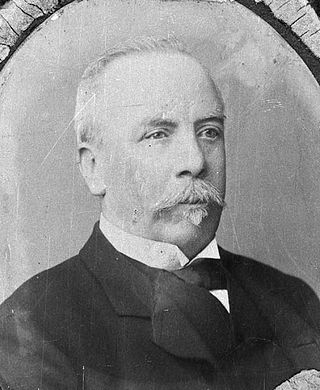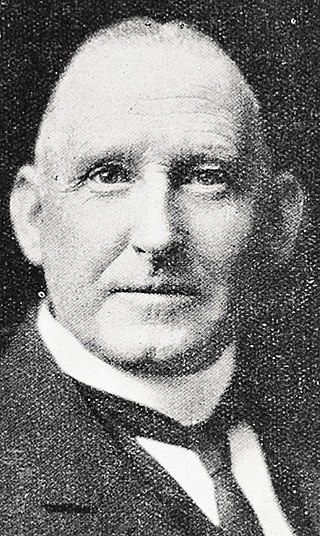
William James Mudie Larnach was a New Zealand businessman and politician. He is known for his extravagant incomplete house near Dunedin called Larnach's castle by his opponents and now known as Larnach Castle. He is also remembered for his suicide within parliament buildings when faced with bankruptcy and consequent loss of his seat in parliament.

Otago Girls' High School (OGHS) is a secondary school in Dunedin, Otago, New Zealand. It was opened 6 February 1871, after a long campaign by Learmonth Whyte Dalrymple. It is one of the oldest girls state-run secondary school in the Southern Hemisphere and the sixth oldest of its type in the world.
The following lists events that happened during 1905 in New Zealand.

Women's suffrage was an important political issue in the late-nineteenth-century New Zealand. In early colonial New Zealand, as in European societies, women were excluded from any involvement in politics. Public opinion began to change in the latter half of the nineteenth century and after years of effort by women's suffrage campaigners, led by Kate Sheppard, New Zealand became the first nation in the world in which all women had the right to vote in parliamentary elections.

Selwyn College is a co-educational state secondary school in Kohimarama, Auckland, New Zealand.
Waitaki Boys' High School is a secondary school for boys located in the northern part of the town of Oamaru, Otago, New Zealand, with day and boarding facilities, and was founded in 1883. As of 2020, it has a school roll of approximately 400 students.
The following lists events that happened during 1826 in New Zealand.
Oliver Duff was a New Zealand writer and editor. In 1939 he was founding editor of the New Zealand Listener, a widely read magazine with a national monopoly on publishing radio and television programs.

The 26th New Zealand Parliament was a term of the New Zealand Parliament. It was elected at the 1938 general election in October of that year.

John O'Donovan was a New Zealand police commissioner. He was born in Ross Carbery, County Cork, Ireland, in 1858. He came to New Zealand in 1878 to join his brother Richard, who had represented Okarito on the Westland County Council (1872–1873) and on the Westland Provincial Council (1874–1876).
John Bruce Young was a notable New Zealand baker, policeman, unionist and police commissioner. He was born in Kaiapoi, North Canterbury, New Zealand in 1888. He was Commissioner of Police from 4 April 1950. He died in office after a period of sickness.

Ward George Wohlmann (1872–1956) was a notable New Zealand policeman and police commissioner. He was born in Invercargill, New Zealand, in 1872.

William Bernard McIlveney was a New Zealand teacher, telegraphist, local politician, policeman and police commissioner. He was born in Greymouth, New Zealand, on 8 March 1867.
James Cummings was a New Zealand police officer and police commissioner. He was born in Tuapeka Flat, South Otago, New Zealand. He was the brother of Denis Joseph Cummings.
Denis Joseph Cummings was a New Zealand policeman and police commissioner. He was born in Tuapeka Flat, South Otago, New Zealand, on 16 May 1885. He was the brother of James Cummings.
Eric Henry Compton was a New Zealand police officer. He served as Commissioner of Police between 1953 and 1955.
The Bruce by-election 1862 was a by-election held in the multi-member Bruce electorate during the 3rd New Zealand Parliament, on 31 July 1862. The by-election was caused by the death of incumbent MP Charles Kettle on 5 June, and was won by Edward Cargill.
Clara Vera Eichelbaum was a New Zealand painter who exhibited as Vera Chapman and Vera Eichelbaum. Her portrait of her father, Sir Frederick Chapman, is in the Supreme Court of New Zealand in Wellington, and other artworks are in the Hocken Collections in Dunedin. Her papers are held in the permanent collection of the National Library of New Zealand.
















